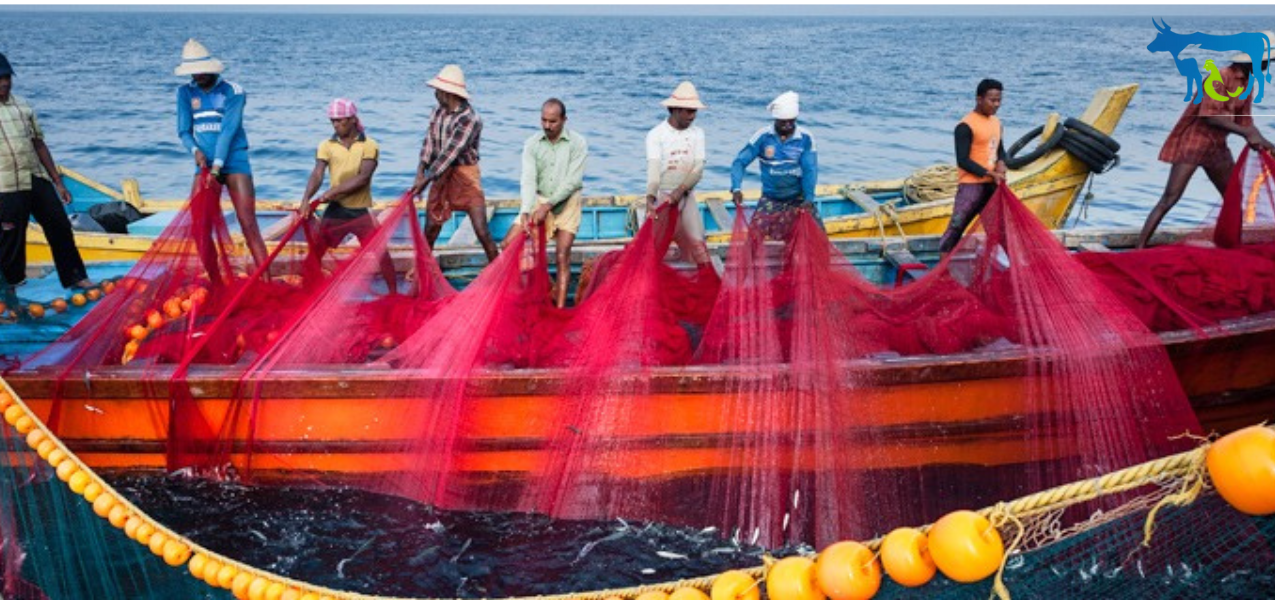New Delhi: The Department of Fisheries, Ministry of Fisheries, Animal Husbandry, and Dairying, Government of India, through has launched a transformative initiative to develop 100 Coastal Fishermen Villages (CFV) into Climate Resilient Coastal Fishermen Villages (CRCFV) on the occasion of 4th Anniversary of Pradhan Mantri Matsya Sampada Yojana (PMMSY). This ambitious effort under Pradhan Mantri Matsya Sampada Yojana (PMMSY) aims to enhance the economic resilience of India’s coastal fishing communities in the face of climate change challenges.
India’s fisheries sector is a crucial pillar of the national economy, playing an indispensable role in providing sustenance, employment, and economic opportunities, particularly in rural coastal regions. With an extensive coastline of 8,118 km, a vast Exclusive Economic Zone (EEZ) spanning 2.02 million square km, and rich inland water resources, the sector is vital for around 5 million marine fishers residing in 3,477 marine fishing villages. However, the increasing impacts of climate change, such as rising sea levels, severe weather events, and fluctuating temperatures, pose significant threats to the sustainability of the fisheries industry.
Hon’ble Union Minister of Fisheries, Animal Husbandry & Dairying and Ministry of Panchayati Raj, Shri Rajiv Ranjan Singh, on the occasion of 4th PMMSY Anniversary celebrated on 11th September 2024 at Sushma Swaraj Bhawan, New Delhi, released guidelines for developing 100 coastal villages across coastal States and Union Territories into Climate Resilient Coastal Fishermen Villages (CRCFVs) . With an allocation of Rs. 200 crore, this initiative will focus on sustainable fishing, infrastructure improvement, and climate-smart livelihoods to ensure food security and socio-economic stability for fishing communities amid changing environmental conditions.
Recognizing these challenges, the Government has allocated ₹2 crore per village under the PMMSY for the development of essential fisheries infrastructure and facilities. The initiative will be fully funded by the central government and is designed to support sustainable economic and livelihood opportunities for fishers, bolster infrastructure, and enhance resilience against climate threats.
The villages adopted for development as climate-resilient coastal villages under the initiative are spread across multiple states and Union Territories covered all 13 coastal states/UT. In Gujarat, the villages identified are Sachana, Navi Bandar, Madhwad, Muldwarka, Bhatt, Jodia, Juna Bandar, and Chorwad. Goa includes Betul and Arambol, while Puducherry has Narambai and Pattinacherry. Daman & Diu features Vanakbara. In Odisha, the villages include Pakharabad, Sanadhanadi, Majhisahi, Kirtani, Jambhirai, Amarnagar, Chudamani, Jamboo, Kharnasi, Talachua, Noliasahi, Sana Nalianugaon, New Boxipalli, Patisonapur, Sahan, Noliasahi, Penthakata, and Arakhakuda. Maharashtra’s identified villages are Kelwa, Arnala, Rangaon, Gorai Tal, Nandgoan, Korlai, Bharadkhol, Srivardhan, Varavade, Kalbadevi, Jaigad, Nivati, Redi, Tondavalli, and Sarjekot.
Karnataka includes Uppunda Madikal, Koteshwara, Kadekar, Bailuru, and Mattadahitlu, while Kerala’s list comprises Eravipuram, Thottapally, Azheekal, Puthuvype, Njarakkal, and Chilakoor. In Lakshadweep, Chetlath Island and Agatti Island have been identified. The Andaman & Nicobar Islands include Durgapur, Chidiya Tapu, Junglighat, Hopetown, and Shoal Bay. Tamil Nadu has selected villages like Pasiyavaram, Senjiyamman Nagar, Thiruvanmiyurkuppam, Paramankeni, Mandavai Pudhukuppam, C. Puthupettai, Puthupettai, Arcottudurai, Puthupattiam, Kumarapanvayal, Soliyakudi, Kalimankundu, Veerapandian Pattinam, Idinthakarai, Arockiapuram, and Erayumanthurai. Andhra Pradesh includes Pedagangallavanipeta, Devunaltada, Iddivanipalem, Pathivada Barripeta, Pedda Uppada, Pentakota, Konapapapeta, Sorlagondhi, Gullalamoda, Adavi Panchayath, Gondisamudram, Palipalem, Tadichetlapalem, Edurupalem, and Thupilipalem. Lastly, West Bengal has identified Akshayanagar, Madanganj, Dera, Dakshin Kadua, and Baguran Jalpai for this initiative.
The development of CRCFVs will involve a range of activities tailored to the needs of each village, identified through detailed surveys and gap analyses by the Central Committee of Climate Resilient Coastal Fishermen Village (CCCRCFV). The initiative will provide common facilities such as fish drying yards, processing centers, fish markets, and emergency rescue facilities, along with promoting climate-resilient practices like seaweed cultivation, artificial reefs, and green fuel initiatives.
Additional measures will focus on enhancing the safety and security of fishermen and vessels, boosting economic activities like aquaculture, and offering support through insurance, livelihood and nutritional programs, Kisan Credit Cards, and training. Moreover, the program will foster linkages and convergence with various Central and State schemes to ensure comprehensive development, integrate fisheries activities, and address gaps in social infrastructure.
This initiative is a strategic step towards strengthening the blue economy and aligns with the broader vision of Viksit Bharat 2047, aiming for sustainable, resilient, and thriving communities across the nation. By fortifying the fisheries sector against climate impacts, it promises to enhance the overall well-being and prosperity of India’s coastal populations.

















Leave a comment